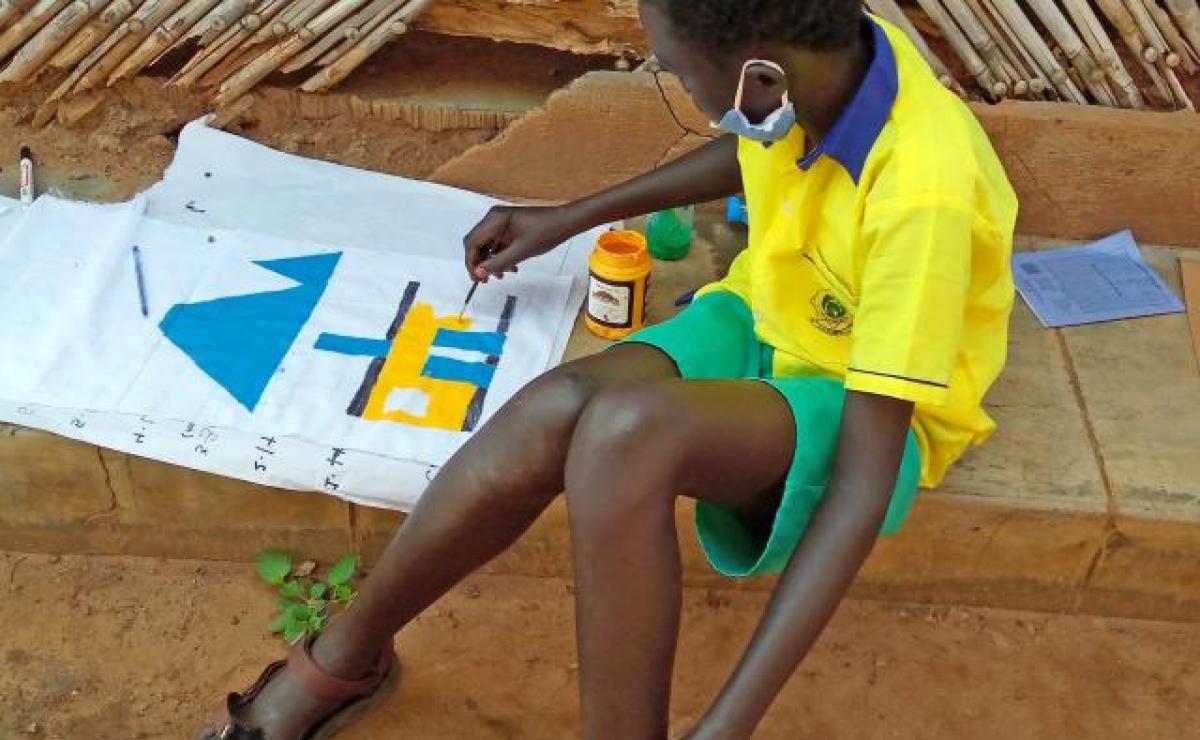Refugee teens talk mental health

LWF conducts retreats for young refugees in Uganda
(LWI) - LWF is running a pilot project focused on the mental health of teenager refugees in Uganda, offering them a way to process trauma and equipping them for the future.
Mabior* holds up a drawing of a boy playing football and a man with a bottle. "I have drawn a photo of myself playing football because I love it so much. My father drinks a lot of alcohol and disturbs us at home. He fights us and causes us to run away," explained the 14-year-old. Mabior is South Sudanese and has been living in a refugee settlement in Northern Uganda for years now. The drawing was made at a mental health retreat for teenagers, organized by The Lutheran World Federation (LWF) country program in Uganda.
Ten groups of teenagers in Palorinya, Adjumani, Lamwo, and Kyangwali refugee settlements participated in the mental health retreat program, which combined recreational activities, therapeutic exercises, and life skills. During the four days, the young refugees played emotional literacy games, participated in conflict resolution training, relaxation exercises, and various sports and art activities. The retreat was part of a pilot program among LWF protection activities supported by the US Government through its Bureau of Population, Refugees, and Migration (PRM).
Regain hope and a future
The teenagers in the refugee settlements in Northern Uganda have survived the second civil war in South Sudan but they paid a high price. They experienced violence at a young age and had to witness atrocities. They lost loved ones, sometimes even their parents or close family members. All of them lost their homes and often treasured belongings.
Their difficulties continue with scarce resources, limited opportunities, and risks of exploitation in the refugee settlement. Many drop out of school or are married early to resolve financial difficulty in the family. Psychosocial officers have noted high rates of depression and even suicide attempts among young refugees. Unaddressed emotions and trauma also lead to conflicts in the camps and settlements. Substance abuse, like in Mabior's family, is common.
The additional challenges of the COVID-19 pandemic caused disruptions in people's social interaction and networks and often exacerbated existing problems and challenges for children and teenagers.
"The objective of the retreat was to help the teenagers who came out of the war to regain hope for the future of their lives," said Patrick Kyeyune Kafuuma, Psychosocial Officer in the LWF Uganda program and in charge of the retreats across the four refugee settlements.
"Supporting children and youth affected by conflict and trauma to reflect on their life experiences is an important step towards healing, emotional wellbeing and nurturing resilient, peaceful and productive individuals and communities," Kafuuma continues. "In facilitating such initiatives, LWF aims to strengthen resilience and improve the children's prospects for the future."
Remember the past, focus on the future
Still, the LWF staff had to approach the young people with great care. LWF staff received training before the retreat; a team of counselors provided individual support to the participants. Playful and artistic activities gave the young people a safe outlet to express feelings. The most popular activity was drawing the "tree of life," which helped the teenagers connect memories and positive experiences in the past to their situation today and a projection of their future.
"I always feel bad about my country not having peace, but I believe South Sudan will have peace one day. My family and I will leave Nyumanzi settlement and go back to our country," hopes Akor, a young girl from South Sudan.
Akor has learned to speak up about things that bother her, express emotions, and support others. "I was timid, I could not talk to many people, but I have gained the confidence to speak about what hurts me and what makes me happy. I also learned to show love to others," she says.
This empowerment is vital for the next step: Psychosocial support officer Kafuuma also facilitates capacity building retreats so that the youth can provide support to others. "Instead of merely facilitating these retreats, the project aims to equip the refugees themselves to carry out the mental health retreats for their community," he says.
Mabior is already determined to talk to his friends about the dangers of alcohol. The workshop also allowed him to focus and think about his future and goals in life. "The tree of life has encouraged me to become a professional footballer so that I can help and support my family," he says with the full optimism of a 14-year-old.
*Names of participants have been altered
LWF/ C. Kästner
Refugees' mental health retreats are part of the PRM-funded ReLiVE (Reconnecting Lives, Vision, and Empowerment) project. In 2021, they will continue in the four refugee settlements to reach more youth, survivors of gender-based violence, and peer educators in child-friendly spaces and women and girl safe spaces.

